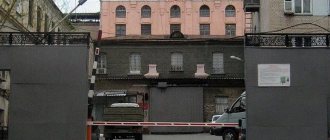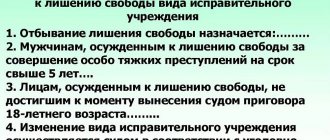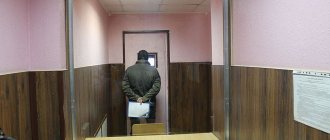According to Article 89 of the Code of Criminal Procedure of the Russian Federation, a convicted person has the right to a certain number of short-term and long-term visits. Exactly how many such meetings are required depends on several factors: the type of penitentiary institution, the severity of the crime, the term of imprisonment and the behavior of the convicted person.
In the article we will further talk about how exactly a long visit in a prison or colony works, what you can take with you, what you can do there, how long it lasts and what services you can get for an additional fee.
Difference from short-term
- For short-term visits – no more than 4 hours with mandatory supervision by a correctional officer.
- For long-term visits – 3 days on the territory of the correctional institution and (in certain cases) 5 days outside it. At the same time, the permanent presence of representatives of the penal system is not provided.
For those staying in a pre-trial detention center, long-term visits are not provided, only short-term ones:
- If you have the status of a suspect (accused), a meeting with relatives is possible only with the written permission of the law enforcement officer conducting criminal proceedings at this stage, and is a maximum of 3 hours, no more than 2 times a month and (Article 18 of the Law of July 15, 1995 No. 103 -FZ).
- In case of involvement as a witness or victim, short-term visits with relatives lasting up to 4 hours, or telephone conversations not exceeding 15 minutes are provided (also with the permission of the investigative or judicial authority). Their frequency is determined by the number of visits granted to the convicted person in a correctional institution (Part 3 of Article 77.1 of the Penal Code of the Russian Federation).
You will find more information about conducting short-term visits in prisons in this material, and here we talk in detail about the differences between short-term and long-term visits in a maximum security prison.
What determines the duration of a date?
First of all, you need to find out from the prisoner himself or the prison authorities what type of visits is allowed. Usually they are divided into two types: short-term and long-term dates. The duration of the meeting depends on the following factors:
- what type of sentence the prisoner is serving;
- what type of prison (general, strict or special regime). This determines how many dates are allowed per month;
- the behavior of the convicted person (whether there are merits or punishments);
- permission from the prison authorities.
Standards depending on the MLS regime and content
The number and duration of long-term visits allowed to convicted prisoners during the year depends on the type of correctional institution and the conditions of the regime for those serving their sentences.
All meetings with loved ones take place on the territory of the correctional institution in specially designated rooms.
The number of long-term visits established by the RF PEC is as follows.
Colony settlement
The number of visits is not limited until the permanent residence of the convicted person with his family (at his expense) is permitted within the colony-settlement or locality where the colony is located. But PS employees are authorized to inspect the residential premises they occupy at any time of the day.
We talk in more detail about what a colony-settlement is in a special article, and read about the regime and conditions of detention in such institutions here.
General regime correctional colony
- For those serving sentences in strict conditions, only 3 long visits per year are allowed.
- Under normal conditions - 4 per year; in addition, for the mother of children under 14 years of age, as well as the father, if due to circumstances he is the only parent of the child, visits with children on weekends and holidays outside the colony may be allowed, but only on the territory of the municipality where the correctional facility is located.
- Under easier conditions – 6 dates per year; and for parents of young children - in unlimited quantities.
You can find more information about the nuances of detention in general regime colonies here.
Strict
- Strict conditions - no more than 2 dates per year are allowed.
- Under normal conditions - 3 per year.
- For the lighter ones – 4 dates.
You can read about how prisoners are kept in high-security prisons here, and in this article we talked about what rules are established for prisoners there.
Special
- Strict conditions - only one date per year.
- Regular – 2 during the year.
- Lightweight – 3 dates.
- A special regime for those sentenced to life imprisonment (Article 127 of the Penal Code of the Russian Federation) - for the first 10 years, such persons serve their sentences under strict conditions and only after their expiration can they be transferred to ordinary conditions (lighter conditions are not allowed).
The number of annual visits for this category of persons is determined by analogy for strict and ordinary conditions - the first ten years, no more than 1 per year, subject to subsequent transfer to the usual regime - 3 visits per year.
You can find out what a special regime colony is and what rules it has for prisoners in our material.
Prisons
- Strict regime - only one date per year.
- For general mode – 2 dates.
Educational institutions for minors
- Strict conditions - 3 long dates per year.
- Regular – 4 during the year.
- Lightweight – also 4 meetings per year, but it is possible to live outside the colony for the period of the meeting.
- Preferential conditions – 6 visits with accommodation outside the walls of the correctional institution.
The convict can count on a first date almost immediately upon his arrival at the correctional institution after his transfer from the quarantine department to the detachment (quarantine is mandatory for all newly admitted to the prison and lasts no more than 15 days). But you will need to write an application in order for the date to be included in the existing schedule and wait for your turn.
Regular meetings with loved ones are scheduled after an equal period, calculated from their permitted number during the year (clause 73 of Order No. 295 of the Ministry of Justice of the Russian Federation).
You can learn more about the features of children's educational colonies for minors in Russia here.
FKU Correctional Colony No. 10 Federal Penitentiary Service of Russia in the Tver Region
Address: 170516, Tver region, Kalininsky district, p/o Mikhailovskoye, Metallistov village
Phone(s)
Head: Karasev Alexander Yurievich
Occupancy limit: 1510 people.
Attention! This map is for illustrative purposes only. The Yandex service is not yet able to accurately determine the position on the map in all cases. In more or less large populated areas, as a rule, the location is determined correctly, but in rural areas and remote areas errors are possible.
Extended information
Federal State Institution "Correctional Colony No. 10 of the Office of the Federal Penitentiary Service for the Tver Region"
Address: 170517, Tver region, Kalininsky district, p/o Mikhailovskoye, Metallistov village
Phones, fax 8 (4822) 38-28-38
Telephone number for citizens to contact and obtain reference information
Schedule for reception of citizens by the colony management on personal matters
Monday – Karasev Alexander Yurievich, head of the colony
Vorobyov Vladimir Nikolaevich, deputy head of the colony, in charge of issues of social and educational work, representations of those sentenced to parole
Tuesday - Mikhail Alekseevich Rybalko, deputy head of the colony, in charge of compliance with the regime of serving the sentence and transfer of convicts from one institution to another
Wednesday – Igor Vladimirovich Podeyko, deputy head of the colony, supervising issues of production activities and employment of convicts
Thursday – Lyapunov Pavel Yurievich, deputy head of the colony, in charge of security issues at the institution
Friday – Artem Gennadievich Svirko, deputy head of the colony, in charge of logistics issues
Reception time: from 13:00 to 17:00
Responsible for organizing the reception of citizens and ensuring consideration of their appeals is Vladimir Nikolaevich Vorobiev, deputy head of the colony
Opening hours for the parcel collection point, holding and waiting rooms for short-term and long-term visits
Tuesday – 10:00 – 16:00
Wednesday – 10:00 – 16:00
Thursday – 10:00 – 16:00
Friday – 10:00 – 16:00
Saturday – 10:00 – 16:00
Applications for transfer and visits are accepted from 10:00 – 10:15, from 11:00 – 11:15, from 13:00 – 13:15
Application for a short-term or long-term visit to a correctional institution
Application for acceptance of transfer to the PS (drawn up in 2 copies)
Store opening hours for visitors
from 8.20 to 20.00 daily, without lunch break
Brief historical background
By Order of the Ministry of Internal Affairs No. 0408 of August 31, 1961, the base established its own strict-regime correctional labor colony for the detention of convicted men.
The production profile of the opened colony was determined at the base. In the early 80s, brick workshops were erected and production expanded. The IK-10 enterprise carried out orders from ZIL.
In 1983, a protocol of intentions was signed on the joint activities of ON-55/10 and Bearing Plant No. 2 (GPZ-2) in Moscow, on the organization of the establishment of the GPZ-2 section at the enterprise, the first batch of three screw-cutting lathes was delivered and the program for the production of three types of ring blanks for the forging group. From that moment on, many years of fruitful cooperation between GPZ-2 and the ON-55/10 institution began.
Currently, PKU IK-10 cooperates with the following companies:
— together with OJSC GPZ-2, it provides services for the manufacture of radial and thrust bearings;
— together with the Moscow company, it provides services for the production of office chairs and furniture of various modifications, and has mastered the production of stands with 164 seats for stadiums. It is planned to expand the range of products manufactured;
— together with Techtrans LLC, it provides services for the production of an intermediate support for the driveshaft, rear-view mirrors and rubber products are produced, and the processing of polymers and the production of granules and products from them (cases for DVDs, hangers, caps) are organized.
The range of clothing products is expanding every year. They produce shoe covers for medical institutions, slippers for fitness clubs and saunas, home suits, and raincoats.
The institution has a bakery, poultry and egg farming, and a greenhouse.
IK-10 has an evening school and a vocational school.
There is a brick temple in the name of the martyr Victor.
Currently, IK-10 is a high-security correctional colony for men who have previously served imprisonment, with a capacity limit of 1,510 places. In IK-10, 13 groups of convicts have been formed, of which 10 have normal conditions of serving their sentences, 2 have light conditions, and 1 have strict conditions. The institution has a punishment cell and a cell-type room.
Information
In what cases can the number and type of meetings be changed?
The following situations are also provided that exclude long visits::
- Visits are prohibited for those placed in a punishment cell (for minors - a disciplinary cell) (Articles 118, 137 of the Penal Code of the Russian Federation). Since the schedule of meetings with relatives is formed taking into account the even frequency between the required number of visits, then, once in a punishment cell, you can be “late” for a meeting with relatives according to the schedule and, as a result, simply lose it.
- For persons who find themselves in an inpatient treatment facility at a medical treatment facility, long-term visits are either replaced by short-term ones or postponed until recovery (clause 134 of Order No. 295 of the Ministry of Justice of the Russian Federation).
- When convicts are transferred to a pre-trial detention center (to participate in investigative actions and trials), long visits are replaced by short-term or telephone conversations, depending on the criminal procedural status:
- for a suspect (accused) – 2 times a month for 3 hours;
for a victim or witness - a 4-hour personal meeting with relatives or a 15-minute telephone conversation (Part 3 of Article 77.1 of the Penal Code of the Russian Federation).
You can find out more information about the peculiarities of keeping prisoners in pre-trial detention centers, pre-trial detention centers and other places of punishment here.
The law provides not only for a reduction in the number of visits, but also for their increase. It is allowed to provide additional visits from relatives in the form of incentives - up to 4 long visits per year in addition to the normative ones (Article 114 of the Penal Code of the Russian Federation).
“You come out of there like you’ve been raped.”
Maria Petrova (name and surname have been changed for ethical reasons and for the safety of prisoners): “OIK-36 is a union of three colonies.
Under one fence is a tuberculosis colony, special regime, strict regime. Rooms for long meetings are the same for everyone.
From the 1st to the 10th - tuberculosis patients go. At our colony No. 5, where my son is imprisoned, visits begin from the 16th to the 30th. Nobody knows whether they treat the premises after tuberculosis patients or not. But we are all afraid of getting infected. In all colonies of the Russian Federation, visiting rooms are signed in advance. The prisoner wrote a statement, wants to go on a date, he was allowed and they tell him the days when the date will be. He has the opportunity to call his parents and let them know.
And people go, knowing that their son has permission and if the prisoner is not in the punishment cell, then the meeting will take place at the appointed time.
And there is no order here. Everyone arrives in unison.
How long does it last?
In standard situations, the time frame for long-term visits on the territory of a correctional institution is limited to three days (Part 1, Article 89 of the Penal Code of the Russian Federation, Clause 69 of Order No. 295 of the Ministry of Justice of the Russian Federation).
But in some cases, the opportunity is provided for communication for up to 5 days and with accommodation outside the colony : this applies to women with a young child - up to 14 years old, as well as men when they are the only parent. Mothers and fathers are allowed additional visits with young children on weekends and holidays.
The procedure and place of the meeting are determined in such circumstances by the head of the correctional institution. But only within the boundaries of the locality on whose territory the institution is located, and provided that the convict’s exit from the colony does not contradict the regime established in the correctional institution (Part 2.1, Article 89 of the Penal Code of the Russian Federation, Clause 69.1 of Order of the Ministry of Justice of the Russian Federation No. 295).
This benefit does not apply to:
- repeat offenders;
- persons convicted of serious crimes to long or life sentences;
- suffering from infectious diseases (such as tuberculosis, AIDS) and alcohol and drug addiction syndromes (the full list of persons is indicated in Part 3 of Article 93 of the Penal Code of the Russian Federation).
At the request of both the convicted person and his relatives, stated in writing, the duration of the meeting may be limited. In addition, with an appropriate written request from the person serving a sentence, a long visit can be replaced by a short one or just a telephone conversation (clauses 75, 82 of Order No. 295 of the Ministry of Justice of the Russian Federation). But it is important to remember that unused days “burn out” and will not be added to future dates.
Equipment for meeting rooms
4 To conduct meetings between convicts and relatives and other persons, appropriate premises are equipped, as a rule, in the checkpoint building.
For long-term visits outside the colony, dormitory rooms are provided for accommodation outside the protected area of convicts who enjoy the right to travel without an escort. Visiting rooms have a separate entrance. The premises of the visiting rooms block include: - rooms for long visits; - hall; - game room; - kitchen; - washroom; - shower; - toilets; — a storage room for storing property and bedding; — a room for short-term meetings; - Sub-Inspector's room.
The last two rooms are separated from all the others. For long-term meetings, a courtyard for outdoor recreation can be equipped. There is a separate waiting room for appointments.
Number of rooms
Who are they allowed in?
The list of persons allowed for long-term visits with a convicted person when living together in the same premises, part 2 of Article 89 of the Penal Code of the Russian Federation and paragraph 70 of Order No. 295 of the Ministry of Justice of the Russian Federation is limited to close relatives - this can be the wife (husband), parents of the convicted person, including adoptive parents, his ( her) children, including adopted ones, grandparents, grandchildren. But there is a clarification - the head of the correctional institution may allow a long visit with persons other than those listed.
In order to enter the territory of the correctional facility, relatives must present documents certifying their family connection with the convicted person. Documents for organizing a meeting :
- passport (required in any case);
- birth certificate;
- marriage certificate (clause 71 of Order of the Ministry of Justice of the Russian Federation No. 295).
If there is a difference in surnames, relatives need to think in advance which documents are best to take. If it is necessary to include copies of other people’s documents to confirm the relationship, they must be properly certified (notarized or by government agencies).
Quite often, people calling themselves “common-law wives (husbands)” apply to correctional institutions for permission to visit and are very surprised when they receive a refusal. In fact, civil marriages are marital relations officially registered in the registry office. Living together between partners without the notorious “stamp” in the passport from a legal point of view is simply cohabitation, which has no legal consequences.
The number of relatives to visit a convicted person, including minor children, is not limited by law. In paragraph 71 of Order No. 295 of the Ministry of Justice of the Russian Federation, it is only clarified that the number of participants in a meeting depends on the capacity of the premises for long meetings, as well as the schedule for their provision drawn up by the administration of the institution.
To avoid misunderstandings, relatives should find out the possibilities of the PS in advance, especially if you plan to take minor children on a date.
Equipment for meeting rooms
Page 20 of 22 Premises for meetings between convicts and relatives are, as a rule, equipped in the checkpoint building. To conduct long-term visits outside the institution, it is recommended to provide appropriate rooms in the dormitory for living outside the protected area of the institution for convicts and convicts serving their sentences on preferential terms. At the same time, visiting rooms are provided with a separate exit.
The premises of the visiting room block include: a playroom (children's) room, a kitchen, a washroom, toilets, a shower room, a storage room for storing clothing and bedding, as well as a room for short-term visits and a room for the controller for conducting them. The premises for short-term meetings and the room for the controller for conducting them must be separated from the rest. Whenever possible, long-term meeting rooms are equipped with a courtyard for outdoor recreation.
What can be communicated during long dates?
While serving their sentences in places of deprivation of liberty, convicts are required to wear a uniform issued in the colony of the established form. But during long visits, they have the right to use things brought by relatives (clause 76 of Order No. 295 of the Ministry of Justice of the Russian Federation). Accordingly, the transfer (for temporary use) of items of “civilian” clothing is allowed .
It is allowed (and even necessary, since the administration of the correctional institution is not authorized to provide food for visitors) to take on a date almost any food, including food that requires cooking, except those containing alcohol, including alcoholic beverages.
Both relatives and the convicted person can also bring into the meeting room personal items they need, in addition to those prohibited. But the list of prohibited items must be treated very carefully , since the list of things, objects and products excluded from transfer, established by Appendix 1 to Order No. 295 of the Ministry of Justice of the Russian Federation, is quite wide.
What are you allowed to take with you?
Based on the list of things, objects, food products that convicts are prohibited from having with them and receiving in packages (Appendix 1 to Order of the Ministry of Justice of the Russian Federation No. 295), you can bring to a long meeting:
- Clothes, shoes, underwear for temporary wearing by convicts during the meeting, if there is no desire to use the “official” one.
- Clothes and other personal items necessary for the visit period, including for children, excluding those prohibited for use by convicts.
- Food products, excluding anything that may contain alcohol (for example, candy with liqueur). It should be taken into account that at the end of the visit, the convict will not be able to bring into the residential area of the colony products that require cooking using heat treatment (not counting tea, coffee, powdered milk). Taking into account that prisoners are not allowed to make homemade preparations, there is no need to take them on a visit - they will most likely be confiscated.
The following property and substances are strictly prohibited from being brought into the territory of the correctional facility and transferred to a prisoner:
- All types of firearms and bladed weapons and their components.
- Any means of transportation and optical instruments.
- Fire hazardous items, including lighters.
- Valuables – jewelry, cash, regardless of denomination and currency.
- Any documents other than those identifying the prisoner and those related to a criminal record and serving a sentence (copies of sentences, petitions, etc.).
- Alcohol-based products - not only drinks containing alcohol, but also medicines, eau de toilette and other perfumes, hair and oral care products, etc.
- Any medications, including medications, containing narcotic and other potent substances (except those prescribed by a doctor).
- All types of electronic storage media (including those facilitating access to the Internet), mobile communications, photo and video cameras and other computing and organizational equipment and components for it.
- Any piercing or cutting metal objects, including tools, as well as glass and ceramic containers and other objects made from these materials. The exception is aluminum cutlery and canned food in metal cans.
- Topographic maps and compasses.
- Methodological manuals on various types of fighting, the design of weapons, the manufacture of explosives and other substances restricted in circulation - that is, any means that help prisoners resist the protection of a special institution and escape.
- Any uniform and equipment, as well as casual clothing and shoes of an unknown type.
- Extremist and pornographic materials, regardless of the information medium (brochures, magazines, video discs, etc.) as well as “sex toys”.
- Devices for applying tattoos and accessories for them.
- Electrical household appliances (except for razors, factory boilers with a power of no more than 0.5 kW).
- Playing cards.
In colony settlements, those serving their sentences are allowed to have cash and other valuables, “civilian” clothing, bed linen and lighters.
In each correctional institution, depending on the specifics of the regime and location, an even more detailed list of prohibited items is developed on the basis of a federal order. You can get acquainted with it on the official website of the PS. Such a list can also be sent to one of the relatives upon a written application from the convicted person (clause 11 of Order No. 295 of the Ministry of Justice of the Russian Federation).
If prohibited items are found on those arriving on a date, the administration of the penal system institutions is obliged to take appropriate measures depending on the severity of the offense.
- Thus, for the transfer, as well as an attempt to transfer, any food products, items, substances, the storage and use of which is prohibited for convicted persons, Article 19.12 of the Code of Administrative Offenses of the Russian Federation provides for a fine of 3 to 5 thousand rubles with confiscation of such property.
- And for attempting to bring weapons, drugs and other dangerous substances into a correctional facility, criminal liability is already provided.
You can view the list of products prohibited and permitted for transfer to the MLS here.
Some more features
The procedure for long-term visits and the requirements for the places where they are held are the same for all institutions of the penitentiary system , regardless of the regime established in them.
Convicts are released from work for the entire period of meeting with their relatives, but subject to subsequent (previous) work (clause 72 of Order of the Ministry of Justice of the Russian Federation No. 295).
As a rule, convicts are removed from meals in the canteen of the correctional institution, using food brought by relatives. Moreover, going to the canteen 3 times a day, given the need to be searched and searched each time, will take up considerable time.
For preparing food in the meeting rooms, there is a kitchen with all the necessary furniture, household appliances and kitchen utensils.
In order to exclude the possibility of transferring prohibited items to the prisoner, before the start of the meeting and after its completion, he undergoes a thorough personal search and inspection of things (clause 76 of Order No. 295 of the Ministry of Justice of the Russian Federation).
Representatives of the correctional institution explain to relatives the rules for holding a visit (against signature). All property not permitted for the use of convicts (money, valuables, other things) is deposited with the inspector on duty; the list of surrendered property is recorded in a special journal against signature.
The belongings and clothing of those arriving on a date are also subject to a subject search , during which all prohibited items will be confiscated. In fact, it is impossible to refuse an examination, since in this case a long-term meeting simply will not take place, although it can be replaced by a short-term one (paragraphs 77-78 of Order No. 295 of the Ministry of Justice of the Russian Federation).
Where do they take place? Provided linen and items
Following the state policy of humanizing the conditions of serving a sentence and respecting the rights of those sentenced to maintain family ties, the premises for long visits in most correctional institutions today look very decent - at the level of standard hotel rooms of the 3rd category.
Blocks for long-term visits in MLS are equipped, as a rule, in a separate building on an area isolated from the residential area for those serving sentences.
The mandatory set of rooms for meetings, as well as their equipment, are regulated in Appendices 2 and 3 to Order No. 512 of the Federal Penitentiary Service of the Russian Federation dated July 27, 2006.
The following premises are provided:
- A room for a long visit (sleeping area), equipped with hotel-type furniture - single beds, bedside tables, wardrobes, chairs, dining table. Cozy elements such as reproductions, bedside rugs and curtains are also taken into account. The standard also does not forget the ashtray - that is, smoking in the premises is not prohibited. It is clarified that if necessary, a baby cot can be placed in the room.
- The lounge room is equipped with a TV, coffee table and chairs.
- A children's room equipped with children's tables and chairs, toys and children's books (in prisons, the children's room is combined with a recreation room).
- The kitchen contains a mandatory minimum of household appliances and furniture - an electric stove, a refrigerator, an electric boiler, kitchen cabinets, tables, stools, a trash can.
- For hygiene procedures there must be a shower room (baths are not provided) with a hanger for clothes and towels, a mirror, a bench, and a rubber mat.
- The sanitary unit (toilet) must also have a washbasin, mirror, holders for towels and toilet paper.
The list of bedding and linen for correctional institutions is determined by norm No. 6, approved by order of the Ministry of Justice of Russia dated December 3, 2013 No. 216 and includes:
- mattresses;
- pillows;
- blankets;
- sheets;
- pillowcases;
- towels
This list has been supplemented with duvet covers and bedspreads especially for meeting rooms.
Despite the “dry” standards, meeting rooms in MLS today look quite cozy : modern decoration, high-quality furniture, interiors in pleasant colors, high-quality household appliances - everything is as close as possible to home conditions that do not evoke associations with prison cells.
Current legislation does not provide for charging for accommodation in visiting rooms. Providing conditions for meeting with relatives is the responsibility of correctional institutions and is carried out at the expense of budget funds.
Paid services that are additional are provided only at the request of the convicted person or his relatives. This is the provision for individual use of household appliances (refrigerators, televisions, etc.), tableware and kitchen utensils for the visiting period, as well as daily replacement of bed linen (clause 110 of Order No. 295 of the Ministry of Justice of the Russian Federation).
Is there security watching?
PS employees do NOT directly observe the date . After a personal search of the prisoner before the start of the visit and an inspection of his belongings, a procedure for inspecting the clothes and belongings of the persons who came to him and the seizure of all items prohibited for circulation in the MLS, the need for constant monitoring of the progress of the visit disappears.
But representatives of the correctional institution administration are on duty around the clock in the building where the visiting blocks are located, and the situation as a whole is always under their control.
Is it possible to have sex?
Visits in places of deprivation of liberty are permitted, first of all, to preserve family ties between the convicted person and his loved ones, including the intimate side of marital relations.
The concept of “sex” is not mentioned in regulations governing long-term dating. But, taking into account the very possibility of a convicted person having a continuous meeting lasting three days in a room specially designated for meetings and the absence of colony staff, sexual intimacy between husband and wife is implied and is in no way prohibited.
In what cases can they interrupt?
The visit is immediately terminated if a violation is detected by the convict or his visitors of the Rules of Procedure for Conducting a Visit , which are developed separately for each correctional institution based on the requirements of federal regulations (clause 80 of Order No. 295 of the Ministry of Justice of the Russian Federation).
Dates will also be interrupted when special conditions are introduced into the ILS, the possible reasons for which are listed in Part 1 of Article 85 of the Penal Code of the Russian Federation:
- disaster;
- establishment of a state of emergency or martial law in the territory where the PS is located;
- mass riots;
- group disobedience of convicts.
Photographer. Meeting room. US prisons
I have no relatives in the USA. Friends are former prisoners. Who with such a status would let you go on a date? And so it happened. When, in my thirteenth year of imprisonment, I crossed the threshold of the visiting room with a camera in my hand, this became my first meeting with free people after my arrest. And no matter how mentally I tried to prepare myself for such a meeting, for the first fifteen minutes I moved among them on weak, stiff legs. Everything swam before my eyes, and the voices of free people merged into one female voice, forcefully pronouncing words whose meaning behind prison walls is either lost or elevated to legend.
To get to the visiting room from the zone, you need to go through the key keeper's desk, where prisoners are searched. Go into the restroom, where there is nothing except a porcelain toilet and sink. And only then open the door leading to your relatives and friends waiting for you on the rows of station benches.
Yes, if you do not confirm on the visit request form that you knew the prisoner prior to his arrest, the visit will be denied. This is how absentee students are weeded out. For a girl who has come to meet her chosen one, the date begins with a lie.
Along the far wall of the room is a row of vending machines with snacks and drinks.
In one corner there is a high key desk with a dozen monitors.
In the other there is a door leading to the summer pavilion. Covered with an iron roof and recently completed, it heats up to indecent temperatures in the summer, but there are tables and the gaze of the housekeeper is not so felt in the pavilion.
When meeting and saying goodbye, a short hug and a fleeting kiss are allowed. During the date, holding hands is allowed; any other physical contact gives the keyholder grounds to interrupt the date.
First of all, a meeting room is a smell, a pungent, intoxicating mixture of all kinds of aromas. If this is what you breathe in the wild, I sympathize. For myself, after working as a photographer, I decided to forever abandon the use of any aromatic liquids.
In the second, small fast-flying objects are striking, bright, flickering, emitting high-pitched sounds that are barely perceptible to the ear. Everyone brushes these objects aside and slaps them in the face. Fifteen minutes later I remember what these things are called.
Thirdly, of course, women. Damn, how fragile and small they are! I try to hide my eyes and not stare, because the visiting room is filled with angels. Despite the strict ban on any flashy clothing... Hands, wrists, open collars, necks. Angels smile, cuddle and twinkle continuously. Exactly. Merzoids of all ages.
Fourthly, men. Poses, speech, looks. No better and no worse, completely different. It seems that if I close my eyes, from the first words, even from the intonations, without understanding the language, you can guess where the prisoner is speaking and where the visitor is.
Holding the camera like an anchor, I walk around the prisoners and their families, as if observing from the outside the metamorphoses happening to me.
I stop to take a photo, wait for the family to settle down and freeze.
View photo A toddler flies up to me. In his hands is a tape with coupons for photographs from the prison commissary. The little one laughs and puts a tight bundle of coupons into my breast pocket. The package contains an SD card, a phone SIM, a player without a case, you never know what.
Now another family surrounded me, pointing their fingers at the camera screen, looking at the photo. They rub their hot thighs. From the crowd surrounding me, girlish tender fingers take my wrist, unfasten the clasp of the prison watch, and put on something iron instead. I think to myself: if only it’s not made of yellow metal, it’ll be too much.
Another family - the breast pocket is filled with a heap of coupons and contraband. Small electronics and digital media. I don't carry drugs. Someone put a gold chain around my neck with crossed sticks and a figurine of a man attached to them. I didn't notice who.
Another family invites me to sit with them at the table and eat chicken from the vending machine. The piece doesn't fit in my throat. Under the table, nimble little hands are pulling off my worn-out sneakers and fiddling with the laces of something hard and new. Once again I hesitate to look at my feet.
Sweat is pouring off me. My shirt stuck to my back.
I stop near an empty table. Only at the far end is an elderly couple talking inaudibly. I take off my glasses and put them on the table. I wipe my face with a piece of toilet paper. When I return the glasses to my nose, I swear out loud - the diopters are not mine, it seems that it was completely by accident that I exchanged glasses with someone. I go to the key keeper, who has his nose buried in the monitors. Other people's sneakers are too small, you have to squeeze your toes.
Looking over my glasses, I say: I'm done.
“Wait, now they’ll come to search you,” the key keeper yawns and stares at the bracelet on my wrist.
I wait about ten minutes for the key holder in charge of the door leading to the zone.
The prisoners can do without me. In a shared toilet, the only place where you can hide contraband is the insulation of the pipe. But the visiting room floor polisher costs $250 for each item. But I’m afraid myself, and there’s a lot of risk. Another thing is the photographer.
The sleepy black man Thompson arrives. He takes me through the toilet to his post.
- Everything is fine? — he nuzzles his nose into my sneakers.
“Yes, just wonderful,” I agree.
Thompson opens the door to the area.
The section from the visiting room to the stadium, these are wings and a victorious “YES”.
At the stadium, I give the camera to another photographer, who begins to serve the queue of prisoners. I have to enter the names on the coupons into the journal. But first you need to get rid of the “hot” things. And there... look for the wind in the field.
Every key holder and prisoner who visits the visiting room knows the role of the photographer.
sawdust with pva for leveling the floor
Some close their eyes out of laziness while the “suits” are silent, others use the services. But once you start getting greedy...
Source
How to write an application for a long date?
An application for a visit can be submitted by both the convicted person and his relatives in writing, including by recording through the official website of the correctional institution (clause 71 of Order No. 295 of the Ministry of Justice of the Russian Federation).
Any application template has not been approved by law, but the websites of many correctional institutions provide samples and even electronic forms for making appointments via the Internet.
The standard details for the application, which exclude additional questions from the administration of the institution and, accordingly, increase the chances of obtaining permission to visit, are as follows:
- Full name of the head of the department of the penal system;
- legal address of the correctional institution;
- Full name of the applicant, address of his residence and registration (if different);
- passport details (number, where, by whom and when issued, citizenship);
- contact number;
- degree of relationship with the convicted person;
- the name of the document is “Application for a long visit with a convicted person”;
- directly the text of the petition for a long visit, indicating the full name of the convicted person, his full date of birth, the duration of the visit (number of days);
- applicant's signature and date of application.
According to established practice, the application is filled out upon arrival at the colony within the time frame according to the visiting schedule, by hand, legibly (in block letters).
In various samples of correctional institutions posted on websites, statements include template phrases stating that the applicant has been warned of liability under Article 19.12 of the Code of Administrative Offenses of the Russian Federation regarding liability for transferring prohibited items to convicts, about criminal liability for under Art. 228-228.1 of the Criminal Code of the Russian Federation (drug trafficking), on liability for violation of fire safety rules, etc.









